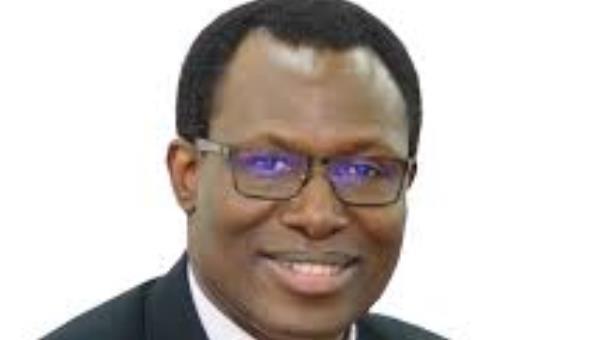Broadcasting
Creating Conditions for Sustainable and Inclusive Growth in Nigeria’s Digital Economy – An Urgent Call for Action

By Engr. Gbenga Adebayo
The renewed Hope Agenda clearly recognizes the power of technology and innovation to enable inclusive economic growth and development. It is an important acknowledgement that if we can create the conditions within which innovation can thrive, we can maintain, or even accelerate the already rapid growth in the digital economy.

Since the liberalisation of the telecoms sector in the early 2000s, the ICT sector’s contribution to GDP in Nigeria has grown progressively. Today, it delivers 17.89% of annual GDP. That is more than double the contribution of oil and gas. From the initial development of connectivity infrastructure and services, the sector has catalysed the emergence of innovative technology businesses across a range of sectors. From financial technology, to data, logistics, transportation, healthcare and education.
It also provides the infrastructure that enables the delivery of critical national development projects, from national identity enrollment and management, to elections and financial inclusion programmes that provide access to vital services for marginalised and vulnerable communities.
While this growth is impressive and the impact on socio-economic development so far has been clear, the journey is far from over. The recognition within the renewed hope agenda is that the sector has the potential to drive a new wave of inclusive economic development that can be the foundation of Nigeria’s economy for decades.
To deliver this, the government has clearly and publicly acknowledged the importance of creating an enabling environment for investment and taken a number of bold steps to address investment bottlenecks. From the tough decisions to unify the exchange rates, to the tightening of monetary policy and a focus on reviewing the tax regime to make it smoother and more efficient. They have also created target investment funds to support key sectors of the economy, from healthcare and agriculture to the small businesses that drive the economy.
The specific role of the digital economy is captured in the Federal Ministry of Communications, Innovation and Digital Economy’s 4 year 2023-27 growth plan, which envisages a further 15% increase in the contribution of the ICT sector to GDP growth, as well as 15% YoY increases in investment in the sector, both of which are projected to support a 100% increase in the annual net revenue that the sector delivers to government.
These are laudable and ambitious objectives, but they are impossible to achieve without deliberate sustained strategic and tactical action. If these actions are not taken, then the foundations that have been built are vulnerable and not only will these objectives be missed, but the industry will stagnate.
If you look carefully at the investment trajectory in the telecoms industry you can see two clear and concerning trends, which are being further exacerbated by the recent short term economic shocks. Between 2021 and 2022 industry CAPEX declined by 30.37% while industry Foreign Direct Investment declined by 46.9%. This happened at a time when operational expenses have surged and it has been exacerbated more recently by rising interest rates increasing the cost of debt. What that means is that industry expenditure has been diverted from capital (expansion and growth) to operations and that the investment environment has deteriorated. The ultimate manifestation of this has been the recent losses declared by major operators for FY 2023 and HY 2024.
This is further exacerbated by the multiple taxation ecosystem that continues to exist across Nigeria, with operators exposed to 54 different federal/state/local government taxies or levies, many of which are technically illegal. There is a perception that the telecoms industry is highly profitable and so can be treated as a ‘cash cow’ – we are now seeing the impact of this, and even though it is clear operators are suffering, more new taxes continue to be considered by the national assembly.
This is a critical moment. It is an inflection point. If we act, we can establish the platform for growth and the delivery of the government’s ambitious objectives. If we delay, or fail to take the decisions necessary, then the industry is likely to go in the wrong direction. This will not only damage the interests of investors, many of whom are Nigerian, but also impact the emergence of the innovative services and products that ride on telecoms infrastructure.
We believe that decisive action can turn this moment from a crisis into an opportunity. Following extensive research, the Association of Licensed Telecom Operators of Nigeria (ALTON), has developed a clear set of recommendations that can catalyse the next wave of growth in the industry, and for Nigeria. These are:
- Take immediate action on retail pricing: In the short term, this means an industry wide increase to retail tariffs, which were last reviewed in 2016, when the exchange rate was N373/$ and inflation at 18.4%. No industry can survive indefinitely in a rapid inflation environment and not be allowed to increase retail prices. Regulators have denied all recent requests, despite approvals being granted in other critical industries from power to fuel and transportation.
- Make industry pricing sustainable: Every price increase requires individual pre-approval from the regulator, which continues to use 2016 pricing guidance. This is an outdated regulatory model that is not representative of global best practice. ALTON recommends the implementation of a general authorization regime for tariff administration under which the NCC sets general pricing principles and requirements and operators independently align their tariffs with the set pricing requirements through self-certification, eliminating the need for prior approval.
- Provide concessionary funding to enable CAPEX investment: To continue to drive investment and growth in infrastructure, the industry needs access to concessionary finance. Establishing a dedicated financing facility will help mitigate the impact of recent interest rate increases and enable more investment.
- Build and expand regulatory capacity: With technology driving rapid change, we need to rapidly upskill the sector’s regulators to ensure the implementation of well structured regulation that provides the right balance between protection and investment incentive. Regulations need to be co-developed more constructively with industry on a regular basis.
If we can deliver each of these things, then we will have established the basis for long-term sustainable growth in the telecoms sector, and through it catalyse dynamic growth in Nigeria’s broader digital economy. This is achievable, and the time is now.
Engr. Adebayo is the Chairman of the Association of Licensed Telecom Operators of Nigeria (ALTON)
Broadcasting
Eedris Abdulkareem Teases New Protest Anthem following NBC Ban

Eedris Abdulkareem, veteran hip hop artiste, is showing no signs of backing down as he hints at releasing another protest song, shortly after his last track was banned by the National Broadcasting Commission (NBC).

Eedris Abdulkareem, veteran hip hop artiste
He recently again stirred the political waters as he hinted at the release of a new protest song, only weeks after his controversial track Tell Your Papa was banned by the National Broadcasting Commission.
The outspoken musician took to social media on Wednesday, April 16, 2025, to share an animated cover design with the words “3 Arms of Government,” suggesting the theme of his upcoming release.
Though the title remains undisclosed, the post was captioned simply with “Stay tuned,” fueling speculation that another hard-hitting social commentary is on the way.
Abdulkareem, known for his unapologetic political views, recently described the NBC’s decision to ban Tell Your Papa as hypocritical. Undeterred by censorship, he appears set to continue using music as a platform to criticize injustice and demand accountability.
The rapper also recently reaffirmed the relevance of his classic hit Jaga Jaga, stating that it would remain the country’s “second unofficial national anthem” until key issues like security, electricity, and governance are addressed.
With another protest song on the horizon, fans and critics alike are bracing for what may be Eedris Abdulkareem’s most direct political message yet.
Broadcasting
MultiChoice Brings Easter Home with Dedicated Pop-Up Channel

In celebration of the Easter season, MultiChoice has announced the launch of a dedicated Easter Pop-Up Channel, offering DStv and GOtv subscribers across Nigeria the chance to experience live broadcasts of key Easter events and services from the Catholic Archdiocese of Lagos.

The special channel, which runs from Thursday, April 17 to Monday, April 21, will be available on DStv channel 196 and GOtv channel 28, bringing the significance and beauty of Easter directly into viewers’ homes.
Throughout the Easter period, the channel will broadcast a rich lineup of live religious events. The programming begins on Thursday, April 17, with the Chrism Mass in the morning, followed by the Mass of the Last Supper in the evening.
On Good Friday, April 18, viewers can join in the Good Friday Tenebrae and the Seven Last Words service, followed by the Stations of the Cross from St. Gregory’s, and later the Passion Service.
The spiritual journey continues on Saturday, April 19, with the Easter Vigil Mass late in the evening, leading into the Easter Sunday Mass on April 20. The channel’s special programming concludes on Monday, April 21, with the Easter Monday Mass from Galilee.
This dedicated pop-up channel is designed for those who may be unable to attend church services in person, as well as for anyone seeking to deepen their spiritual observance during the Easter holidays. By broadcasting these significant events, MultiChoice reaffirms its commitment to providing content that resonates with the cultural and religious values of its viewers.
Subscribers are encouraged to tune in to DStv channel 196 and GOtv channel 28 throughout the Easter period to take part in these important religious celebrations from the comfort of their homes.
Broadcasting
Maximise Your Easter Getaway in Nigeria with Smart Travel Hacks

Easter is almost here, and with it comes the perfect opportunity to escape the everyday hustle and embark on a memorable adventure. Whether you’re craving some ‘chilling’ time, quality ‘family’ time, or a ‘pepper dem’ getaway, Nigeria offers endless possibilities for exploration. And the best part? Travelling locally has never been easier or more affordable.

Whether you’re a ‘newbie’ traveller or a seasoned pro, we’ve got you covered with essential hacks that will make your trip a breeze. Say goodbye to stress and hello to smooth sailing as you navigate your Easter getaway like a true travel expert.
Planning your trip is like packing your suitcase – essential, not optional
Just like you wouldn’t leave home without your power-bank (just in case!), don’t head off on a quick trip without a plan. A little prep can save you time, money, and stress — from booking flights and sorting transport, to packing light and right.
Nigeria has endless ways to travel. Flying with local airlines like Air Peace or Ibom Air is quick and budget-friendly, while renting a car gives you the freedom to explore scenic routes like the drive to Erin-Ijesha Waterfalls or the journey to Obudu Cattle Ranch. Not into driving? Buses like Peace Mass or God is Good are easy and affordable. And for a truly luxurious experience, you could even consider a chartered flight – if you’re balling!
Travel like a pro: The art of smart packing
Packing smartly is a crucial travel hack that can save both time and money. Amelia Campher recently shared on TikTok how she organised her hair, beauty, makeup, and personal accessories into different vanity cases and toiletry bags from Temu. Each one perfectly stores her daily essentials, keeping everything neat and accessible. She excitedly told her followers, “This is your sign to buy these bags!” Her clever packing strategy ensures that she’s ready for any trip without unnecessary clutter or stress.
Take Jasmin’s experience, for example. After getting hit with extra carry-on fees on a previous flight, she decided to be smarter about her upcoming family trip. In her search for a solution, she found the perfect backpack on Temu for just under ₦40k. Ticking all the boxes, it avoided extra carry-on fees and allowed her to efficiently pack 16 items plus a makeup bag. When they arrived at the airport, Jasmin’s family breezed through check-in with no issues, their backpacks meeting size requirements perfectly. No extra charges, no stress; just a smooth start to their unforgettable five-day family trip.
Backpacks aren’t just ideal for air travel – they’re also perfect for road trips. Whether you’re cramming your car with family and their belongings or flying high, packing smart and light is essential. A compact, well-organised backpack can make your journey easier, no matter the mode of transport.
To avoid unexpected charges when flying within Nigeria this Easter, it’s crucial to familiarise yourself with airline baggage policies; while Economy Class typically permits 15kg to 20kg of checked luggage, and Premium Economy or Business Class allows up to 30kg, always verify specific weight limits with your chosen airline to prevent costly excess baggage fees, especially if you plan on packing more than the standard allowance.
No passport needed: Pack your bags for a Naija Detty Easter
Why travel halfway across the world when Nigeria has it all? This Easter, skip the long-haul and discover the treasures on your doorstep. From the buzzing streets of Lagos to the ancient city of Benin and the serene hills of Jos, unforgettable adventures are just a short trip away.
By travelling locally, you’re not only creating new memories — you’re also supporting local tourism and helping grow our economy. With so many destinations to explore, there’s something for every kind of traveller. So pack your bags, plan smartly, and make this Easter your best Naija Detty holiday yet.

 Telecom3 days ago
Telecom3 days agoMTN Nigeria Takes Broadband Services to the Next Level with FibreX Launch

 News3 days ago
News3 days agoSERAP Files Lawsuit Against NBC Over Ban on Eedris Abdulkareem’s Protest Song Tell Your Papa

 Telecom2 days ago
Telecom2 days agoDigital Transformation Remains Africa’s Gateway to Economic Advancement – Adumike

 Telecom2 days ago
Telecom2 days agoPAFON 2.0: Experts Discuss Pathways to Boost Financial Inclusion in Nigeria

 E-Financial2 days ago
E-Financial2 days agoCBN, NGX Group Defend Economic Reforms at Nasdaq

 General News2 days ago
General News2 days agoEFCC Clarifies SCUML Certificate Misuse amid CBEX Ponzi Scheme Scandal

 E-Financial3 days ago
E-Financial3 days agoFCMB Group Redefines Corporate Storytelling with The Power Of The Group TVC

 General News2 days ago
General News2 days agoFlashChange Partners Ruth Foundation to Empower Vulnerable Children in Alimosho with Skill Acquisition



























